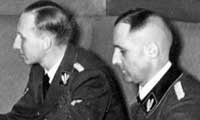 Thursday, December 16, 1999
U.S.
Doubted Gestapo Chief Died By Jonathan D Salant
Associated Press Writer WASHINGTON
(AP) - Within a year after
World War II ended, U.S. Army intelligence agents
doubted reports that Gestapo chief Heinrich
Müller had committed suicide, according to
documents released Wednesday.  Müller,
the head of the German secret police, has never
been found, and remains one of just two big-name
Nazi war crimes suspects still being sought. Müller,
the head of the German secret police, has never
been found, and remains one of just two big-name
Nazi war crimes suspects still being sought.
The documents released by the National Archives
include reports putting Müller in a variety of
countries in the decades following the war,
including Argentina, Czechoslovakia and Cuba. "Müller has never been apprehended and no
one knows his whereabouts," said Rabbi Marvin
Hier, dean and founder of the Simon
Wiesenthal Center, a Los Angeles-based center
for Holocaust remembrance. "Müller today is probably dead but nobody
knows what happened. These documents indicate that
it was the opinion of some elements of U.S.
intelligence that he survived. History deserves a
full accounting of what happened to him." The Gestapo used terror, murder and mass arrests
to enforce loyalty to the Nazi government and also
ran the concentration camps where six million Jews
died. In 1946, Army intelligence reported that "no
confirmation" of Müller's death could be
found, despite rumors that he had killed himself,
his wife and three children, according to the
documents. That same year, the Army received rumors that
Müller had fled Berlin, possibly through the
same secret tunnel as Adolf
Eichmann, who oversaw the deportation and
murder of Jews and promoted the use of gas chambers
in the concentration camps. Eichmann was kidnapped
in Argentina in 1960 by Israeli agents and brought
to Israel, where he was hanged. In July 1960, one Army intelligence report
concluded: "It is more likely that at the end of
the war, Müller fled and now lives either
inside or outside Germany under a false name." A
year later, his former mistress told agents that it
was possible he survived the fall of Nazi
Germany. Between 1946 and 1963, various reports had
Müller working for security forces in Soviet
Union, Czechoslovakia or Argentina, according to
the files from the U.S. Army Intelligence Command
at Fort Meade, Md. In March 1951, for example, intelligence agents
reported that "convincing facts" put Müller in
Czechoslovakia, where he was directing intelligence
activities for the Soviet Union against the United
States in Germany. A month earlier, another report had him training
and organizing the security police in communist
Czechoslovakia. An informant reported in April 1955 that
Müller was directing or helping intelligence
efforts in the Soviet bloc. In 1961, two separate
reports said he was continuing to work for Russian
intelligence or security. And a November 1963 report had him in Cuba,
where he may have fled after the overthrow of
Argentinean dictator Juan Peron. According
to this report, Müller went to Argentina after
1945 and helped train the federal police force.
Argentinean researchers reported last year on
documents they said proved Peron encouraged fleeing
Nazi war criminals to seek asylum in his country.
The papers did not provide a list of who actually
immigrated. The theory that Müller fled to Argentina
after World War II was buttressed in July 1995 when
former Czechoslovak communist leader Rudolf
Barak claimed his agents kidnapped him from
Argentina in 1956 and turned him over to the KGB.
The KGB claimed other Germans later killed
Müller in a Russian prison. The other top Nazi whose whereabouts are still
unknown is Alois Brunner, commandant at the
Drancy transit camp in France, where Jews were
interned before being sent to the Auschwitz death
camp. Brunner, in his late 80s, is believed to be in
Syria, which the government repeatedly has denied.
His daughter has said that Brunner is dead. Israel and the United States should demand a
full accounting of Brunner's whereabouts from Syria
during the current peace talks, Hier said. "Part of making peace with your neighbors will
be coming to terms with the fact that it is
unacceptable to grant safe haven to one of the
architects of the Final Solution," Hier
said. © Copyright 1999
Associated Press. |